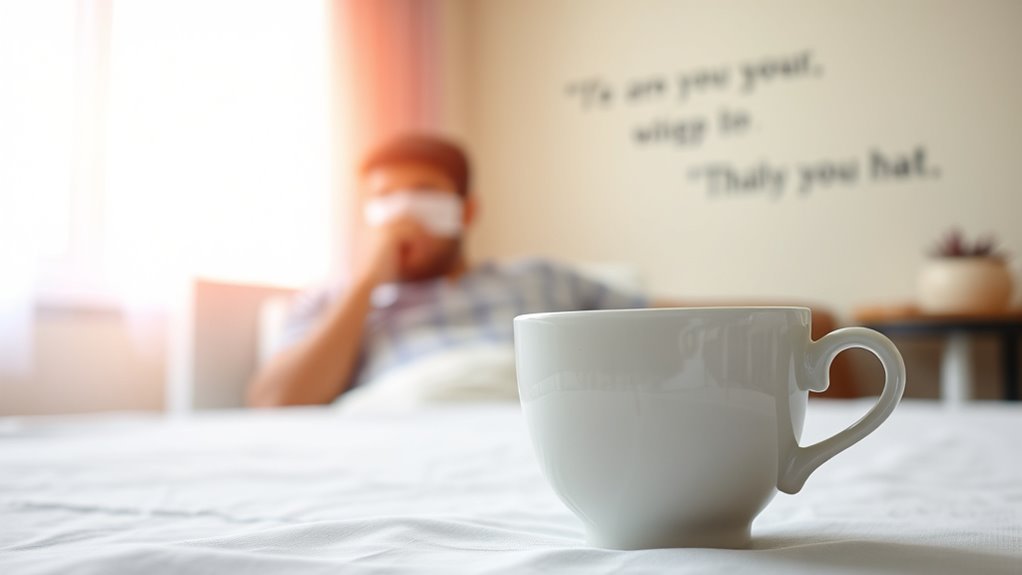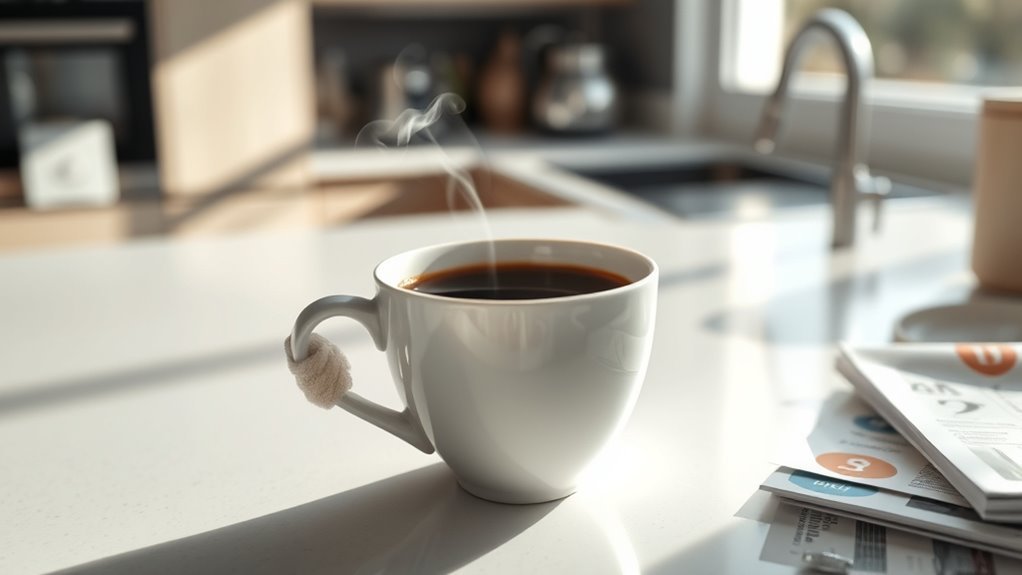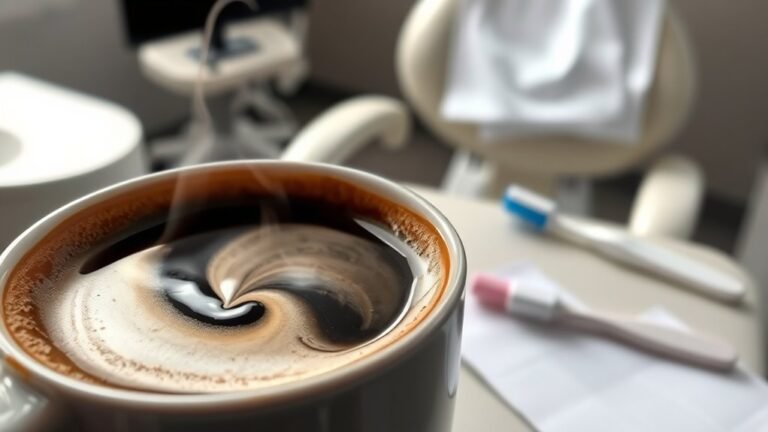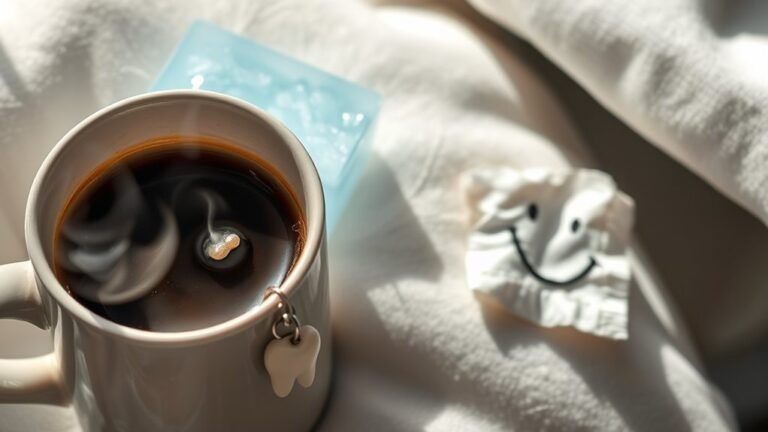Can I Drink Coffee After Rhinoplasty
After rhinoplasty, it’s best to avoid coffee during the initial recovery days. Caffeine can elevate blood pressure and interfere with sleep, both of which are essential for healing. It can also lead to dehydration due to its diuretic effects, worsening swelling. If you’re considering reintroducing caffeine, wait until swelling decreases and consult with your surgeon about safe timing. Staying informed on your recovery process will help you make the best choices for healing.
Understanding Rhinoplasty Recovery

Understanding rhinoplasty recovery is essential for ensuring a smooth healing process, especially since the initial days after surgery can greatly impact your final results. During this period, effective swelling management is vital. You’ll likely experience significant swelling, peaking around 48 to 72 hours post-surgery. Following your surgeon’s guidelines on ice application and head elevation can help minimize this discomfort.
Your healing timeline will vary, but generally, most visible swelling subsides within three weeks, while subtle changes may continue for months. Staying hydrated and following a balanced diet can also support your body’s recovery. Remember, patience is key; allowing your body the time it needs will help you achieve the aesthetic freedom you desire in the end.
The Role of Caffeine in Healing
While caffeine can offer some benefits, it’s important to take into account its effects on healing after rhinoplasty. Caffeine metabolism can vary from person to person, influencing how your body processes medications and nutrients vital for recovery. During the healing processes, you want to guarantee ideal conditions for your body to mend effectively.
| Effect of Caffeine | Healing Implications | Recommended Actions |
|---|---|---|
| Increased heart rate | May elevate blood pressure | Monitor your intake |
| Diuretic properties | Can lead to dehydration | Stay well-hydrated |
| Potential inflammation | Might affect swelling | Limit intake during recovery |
| Sleep disruption | Impacts rest and recovery | Opt for caffeine-free options post-surgery |
Understanding these factors can help you make informed decisions regarding caffeine consumption during your recovery journey.
Potential Risks of Drinking Coffee

Consuming coffee after rhinoplasty carries several potential risks that can hinder your recovery. One significant concern is caffeine sensitivity, which may be heightened post-surgery. If you’re prone to this sensitivity, coffee could lead to increased anxiety, restlessness, or sleep disturbances, all of which can impede healing. Additionally, caffeine can elevate your blood pressure, which is particularly critical after surgery when your body needs to stabilize. Increased blood pressure may strain your healing tissues and complicate your recovery process. Moreover, if you’re taking pain medications, caffeine can interact with them, potentially leading to undesirable side effects. To guarantee your recovery remains on track, it’s wise to carefully consider these risks before indulging in that cup of coffee.
When to Avoid Caffeine
After rhinoplasty, it is essential to know when to avoid caffeine to support your healing process. Generally, it’s best to steer clear of caffeine during the first few days post-surgery. This is when your body is most sensitive to stimulants, and caffeine sensitivity can exacerbate swelling and discomfort. Additionally, caffeine can interfere with your sleep patterns, which are critical for recovery. If you’re taking prescribed medications, check with your doctor, as caffeine may interact negatively with them. Once you feel more stable and your swelling has considerably decreased, you might reintroduce caffeine cautiously. Always listen to your body; if you notice any adverse reactions, it’s wise to cut back. Prioritize your healing journey by being mindful of caffeine intake.
Recommended Alternatives to Coffee

If you’re looking for alternatives to coffee during your recovery from rhinoplasty, you’re in luck—there are several options that can provide a comforting beverage experience without the caffeine. Herbal teas are an excellent choice, offering a variety of flavors and calming effects. Chamomile, peppermint, and ginger teas can soothe your body and mind while promoting relaxation. Additionally, you might consider decaf options if you still crave the taste of coffee. Decaffeinated coffee retains much of the flavor you love, minus the jitters. Experimenting with these alternatives not only keeps you hydrated but also supports your healing process. So, sip on these comforting beverages and enjoy your recovery with a sense of freedom from caffeine!
Tips for Gradual Reintroduction of Caffeine
As you consider reintroducing caffeine after your rhinoplasty, timing is vital to guarantee your body adjusts well. Start with small amounts and pay attention to how your body responds, while also prioritizing hydration to support your recovery. Balancing your coffee intake with other fluids can help you enjoy your favorite beverage without compromising your healing process.
Timing Your Caffeine Intake
While your body heals from rhinoplasty, carefully timing your caffeine intake is essential for a smooth recovery. Caffeine metabolism can vary considerably from person to person, influencing how quickly your body processes it. After surgery, it’s wise to avoid caffeine completely for at least the first few days when your body is healing most intensely. Gradually reintroducing caffeine after this period allows you to monitor how it affects your recovery timeline. Start with small amounts and pay attention to any changes in swelling or discomfort. By being mindful of your caffeine intake, you can enjoy its benefits without compromising your healing process. Always consult your surgeon for personalized advice tailored to your specific situation.
Hydration and Coffee Balance
Reintroducing caffeine after rhinoplasty requires a careful balance with hydration. Start by gradually reintroducing coffee, paying attention to your body’s signals. It’s vital to keep hydrated, as caffeine can be dehydrating. Aim for at least eight glasses of water daily, and consider hydration tips like infusing your water with fruits for added flavor. If you’re unsure about your coffee intake, explore coffee alternatives like herbal teas or decaffeinated options that can still provide comfort without the caffeine punch. Monitor how your body reacts to these changes, adjusting your consumption as needed. This approach guarantees you enjoy your favorite beverages while prioritizing your healing process. Balancing hydration and caffeine will help you feel your best post-surgery.
Listening to Your Body During Recovery

How can you best gauge your body’s needs during recovery from rhinoplasty? It’s essential to develop self-awareness cues that help you interpret your body’s physical signals. Here are four key aspects to reflect upon:
- Pain Levels: Monitor any discomfort; pain is a strong indicator of how well you’re healing.
- Swelling and Bruising: Notice changes, as excessive swelling could signal complications.
- Energy Levels: Listen to your body; fatigue might mean you need more rest or hydration.
- Emotional State: Acknowledge feelings of anxiety or frustration, as they can affect your overall recovery.
Frequently Asked Questions
Can I Drink Decaffeinated Coffee After Rhinoplasty?
Yes, you can drink decaffeinated coffee after rhinoplasty. Decaf coffee offers benefits like hydration and antioxidants without the stimulating effects of caffeine, which can sometimes increase blood pressure and swelling. If you’re looking for caffeine alternatives, consider herbal teas or caffeine-free beverages. These options can help you stay refreshed while allowing your body to heal properly. Always consult your surgeon for personalized advice, but decaf is generally a safe choice post-surgery.
What Other Beverages Should I Avoid During Recovery?
During your recovery, it’s essential to prioritize hydration. You should avoid alcohol and sugary drinks, as they can interfere with healing. Instead, focus on water and herbal tea, which can provide soothing benefits. Herbal teas can help reduce inflammation and promote relaxation. Staying hydrated will support your body’s recovery processes, so make it a priority. Remember, your body needs the right fluids to heal effectively and feel its best.
How Long After Surgery Can I Resume My Normal Diet?
Once the storm of surgery has passed, you’ll want to nurture your body with the right post-surgery nutrition. Generally, you can resume a normal diet within a week, but listen to your body; it’s your guide through this recovery timeline. Start with soft foods and gradually introduce solids. Hydration is key, so keep sipping water. Remember, each day brings you closer to feeling like yourself again, so embrace this journey!
Will Drinking Coffee Affect My Pain Medication?
Drinking coffee can affect your pain medication due to potential interactions. Caffeine may enhance certain side effects, like increased heart rate or anxiety, especially if you’re sensitive to it. If you’re taking painkillers, it’s essential to consult your doctor about combining them with caffeine. You want to guarantee your recovery remains smooth, so understanding how your body reacts can help you make informed choices about your diet and comfort during this healing period.
Can Stress From Caffeine Affect My Healing Process?
Caffeine effects can indeed influence your healing process. Stress from caffeine can elevate your heart rate and blood pressure, which might hinder recovery. During this critical time, it’s vital to focus on healing factors that promote recovery, such as rest and hydration. If your body’s under stress, it could slow down the healing process. It’s wise to limit caffeine intake to guarantee your body can heal effectively and efficiently.






